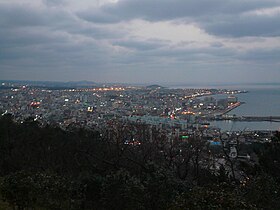 |
| Foreigner |
Under the FTA – or Free Trade Agreement – which South Korea signed up to this year with what's left of the European Union, Santa Claus is now allowed to import goods into Korean unimpeded for the first time, even if he declares their value as being over the customs limit of $125 and only vaguely describes the items as 'gifts' and the intended recipients as being 'children'.
Previously, South Korea's own domestically originated Santa – who is known as 'Mr. Ho' - fulfilled the role of distributing such items to children, but there were fears that there would be no presents in Korea this year after the government enacted legislation recently banning repeat sex offenders from working with children.
The anti-FTA protesters say that in addition to breaching Korea's anti-dumping legislation – unlike Korea's Santa Ho, 'Santa Claus' is believed to distribute toys to children at below cost price or even for free – there is also evidence that the foreign Santa is evading customs procedures by bypassing ports and failing to pay import duties. In addition, they say that Santa Claus' visa status should be investigated, as he may have no right to work in Korea.
Many among the protesters are fearful of the impact Santa Claus may have on their own lives. 38 year-old Kim, who says he often goes around giving children he doesn't know presents, says he fears that Santa's foreign activities may cause him to lose his job.
But Korea's large corporations, or 'chaebol' as they are known, oppose legislating against Santa Claus' operation. They are thought to be particularly interested in the possibility of replacing Korean workers with elves, who according to reports work longer hours for less money and holiday time than even the slave laborers they currently employ in the Kaesong Industrial Complex in North Korea. "Elves are the future... or robots" said a spokesman for Korea's largest corporation – Seongsan – who said he didn't have a name for legal reasons.
The anti-FTA protestors say the government should do more to ensure Santa Claus complies with local market regulations. Following the signing of FTA agreements with the EU and US, Korea has been under pressure to remove some rules which have been called artificial barriers to entry for foreign manufacturers into the Korean market, with toy buggies cited among numerous other examples. Local safety laws mandate that foreign buggies are properly crash tested – while toy buggies manufactured in Korea have obviously been made with the safety of Korean children foremost in the manufacturers' minds - foreign buggies must prove they adhere to local safety standards, which means they must be crash tested with a Korean child inside to ensure compliance with regulatory requirements. But many foreign manufacturers have been reluctant to participate in live crash and drop testing "Which is their choice" said a spokesman for the Ministry of Foreign Affairs and Trade.
With Santa Claus deliberately evading Korea's ports, effectively smuggling goods like unsafe foreign buggies and other deadly toys into Korea, the candlelight protesters say the government must ban Santa Claus' entry into Korea tonight or arrest him if he tries to step foot on Korean territory.
Related Links
FTA gives big boost to Korea-EU trade
Koreans pay $35 for $6-bottle of Montes Alpha red
Thousands of Koreans stage street protest against free trade deal with U.S.
When protest is a joke
Pay raise at Kaesong park
Vitality at Kaesong Complex
27 sex offenders worked with adolescents: police
Disclaimer: Please note the links above are generated automatically by our software and may not always be directly related to the news article.






